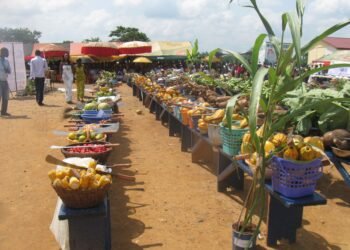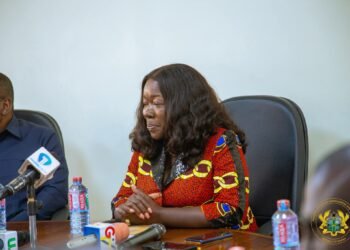Ms Esther Agumah, Livestock Officer at the Regional Directorate of the Department of Agriculture, has disclosed that the beneficiaries of the President’s Flagship Programme, Rearing for Food and Jobs (RFJs), in the Upper East Region have refused to go by the conditions under which they benefited from the support given them.
According to the Livestock Officer, the government and the farmers had agreed to breed the ruminants and birds and give out their offspring to other beneficiaries but failed to do so when the young ones were old enough to go to other farmers.
The programme started as a pilot programme in 2019 in five regional districts of the region, distributed improved livestock breed, mainly sheep distributed improved females to one male per farmer in the Kassena Nankana Municipality, Kassena Nankana West, Bongo and Bawku West Districts and Nabdam District.
“2,000 sheep were distributed in the pilot year, 2019 to smallholder farmers in the Nabdam District and it was planned that their offspring would be distributed to other farmers by 2021 but nothing was recovered from the Nabdam District.
“Each farmer under the pilot received 10 sheep, nine females and one male and the condition was for each to repay 18 of the offspring.”
Ms Esther Agumah
Meanwhile, Ms Esther Agumah noted that there is a school of thought that the action of the Nabdam district beneficiaries was political as some felt the package was a gift.
“We have a lot of challenges with the programme, though the programme has been reviewed and farmers are expected to repay one male offspring and nine females instead of the 18, the farmers are still recalcitrant to give back.”
Ms Esther Agumah
Challenges of the RFJs
The Livestock Officer at the Regional Directorate of the Department of Agriculture asserted that the situation is just one of the challenges the programme has encountered. The rest, she stated, include diseases and death of livestock, among others.
However, an interaction with some beneficiaries revealed that most of the sheep were doing well. Madam Hannah Laadi Bukari, a farmer, and chairperson of the ‘women in Agriculture’ platform in Nangodi said the RFJs had been a helpful programme.
“I received ten sheep in number but in the beginning, I lost four of the sheep leaving me with six of them but that, notwithstanding, the remainder had done well because last year I made sales of some of them to the tune of GHC 2,250.00 and I still have thirteen of them.”
Hannah Laadi Bukari
The modalities of the programme targeted women and youth and recoveries of the offspring were expected to be made in two years where the young ones would be passed on to other beneficiaries.
This module was officially launched by H. E. President Nana Addo Dankwa Akufo Addo at Wa in the Upper West Region on June 25th, 2019. The objective of the RFJ is to develop a competitive and more efficient livestock industry that increases domestic production, reduces importation of livestock products and contributes to employment generation and to the improvement of livelihoods of livestock value chain actors and the national economy.
READ ALSO: Ukraine Makes Advancement on Russian Troops in Donbas Posing Threat to Putin’s Grip on the Region























